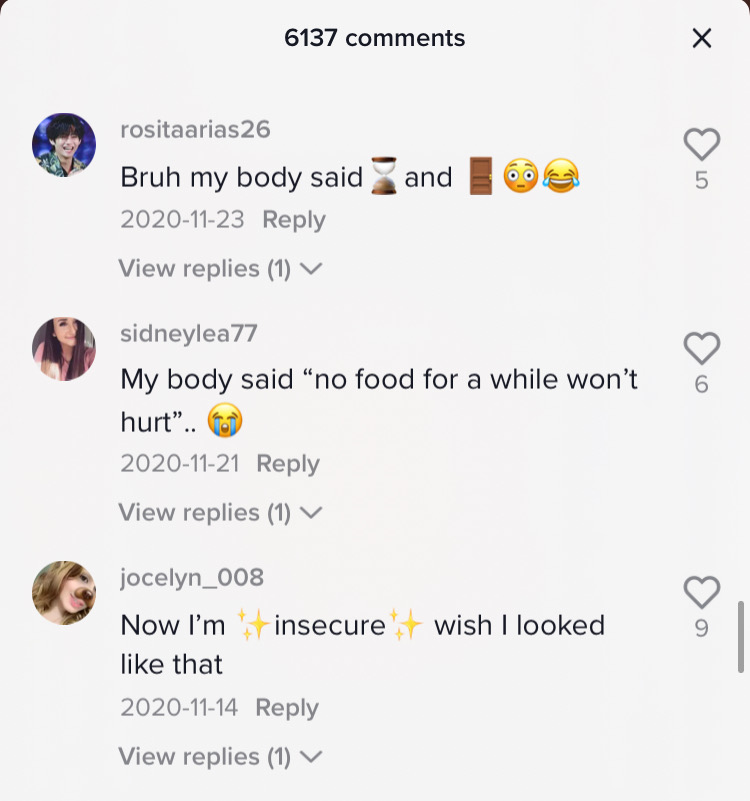“Body goals”
Examining the toxicity behind using the phrase “body goals”
September 21, 2021
I’ve been skinny my whole life. It has always been difficult for me to gain weight, and consequently, I’ve been ignorant of to the selectiveness and inclusivity of social media. But in March of 2020, I started to see ab workouts and “10 minute hourglass workouts” on the recommended sections of my Instagram and TikTok accounts. I would see comments on my Instagram feed that would say “body goals” or “BODYY,” but only under pictures of girls who specifically had an hourglass body.
Seeing comments like these daily on others’ TikTok and Instagram posts made me, and others who do not fit this trend, feel undeserving of being the recipient of such compliments. The ideal female body type I see so often see on social media is, frankly, a grossly oversexualized parody of reality, consisting of “a big butt, thick thighs, wide hips, [and] a skinny waist.” But the trend of the nearly unattainable body type is not reserved to women — for men, it includes having broad shoulders, abs and being muscular. When we selectively praise bodies, we buy into a toxic culture on social media that capitalizes on the unattainability of these ideal bodies. For me, that manifested in the implication that other body types are less deserving of the same praise and love.
And I’m not alone. The influx of teenage suicides, which rose among girls specifically by 50% in January and February of 2021 can be directly tied to body-related content on social media platforms. Social media heavily impacts many of us, and with so much content that stresses the importance of an hourglass figure, I felt I had to strive for this impossible ideal body type in order to be socially accepted.
Body-related praise overall is fundamentally harmful. According to CNN’s study on praise, the confidence boost and serotonin that you feel when praised for your body can be addicting. To achieve this feeling, teenagers have increasingly been pushing themselves to change their physical appearance through increasingly extreme measures, which has led to an uptick in eating disorders, body dysmorphic disorder and severe depression.
Heavy influence and the desire for social approval can also lead to teens feeling like they have to edit their pictures or bodies because they don’t fit the “standard” and feel others find their body unattractive. I still remember when being skinny was such a massive trend that kids as young as preteens would push themselves to not eat certain foods, fast, diet or even throw up their food. Fast forward to now and the current body trends, I still see this toxic culture and people taking extreme measures, manifesting in similar disordered eating and obsessive workout culture. Teens should not feel pressured by social media or society to take these measures because every body is different and has different needs.
Scientifically speaking, our body shapes are different because shape is determined by a variety of factors including genetics, diet, lifestyle and age. For example, some people have a fast metabolism and have a harder time gaining weight, and others with slower metabolisms may gain weight more easily.
It can be argued that “body goals” is just a compliment and by complimenting one’s body type it does not mean you are bringing down everyone else’s. By complimenting someone’s body, you are focusing on superficial aspects of a person. Why comment on someone’s hourglass figure when you can complement their artistic ability or carefree spirit? Sometimes commenting on a body type can also quickly turn sour — you don’t know the background of every person and what their body has been through. Instead, you can aim compliments towards someone’s talent, sense of humor or compassion. Straying away from superficial comments can make your compliment more genuine.
As teenagers, it is important to not hold our physical appearances to an impossible standard, especially ones created by pre-teens on TikTok. By doing so, we are enabling the mentality that we need approval from others about our looks to feel good about ourselves and that others’ opinions are more important than our own. By creating this mindset early on, as teenagers, it is likely to be something that we hold onto into our adult lives. This is particularly toxic when it is in regards to our physical appearance or body. When a natural aspect of ourselves is critiqued, those opinions should not be something we hold onto or even bother listening to. Rather, we should embrace our bodies for what they are and not seek validation from others regarding our appearances. This can be achieved by actively trying to not compare yourself with others and learning to value your feelings over what others think about your appearance or body.
Our bodies are more than what they look like. They allow us to breathe, live and experience life. Having a healthy body and caring for it is more important than pushing ourselves to be something we aren’t.


















